Everyone told us Bangkok would be beautiful. Modern. Developed. Great
for shopping. The roads would be great. The airport would be fantastic.
We rolled our eyes and said, Yeah, yeah, yeah. The image of Bangkok as a
third-world city would not be dislodged from our heads.Until we
came out of the walkway leading from our plane and stepped into the
airport. With wide eyes, gaping mouths and short breaths, we took it all
in. The cleanliness. The modernity. The space. The airiness. The
convenience. The air of prosperity. The efficiency at the immigration
counter. The orderly baggage claim area. We landed on a Saturday,
perhaps it was just the weekend lull. But still.
A ride into the city did nothing to dispel any of these initial reactions. The roads were great. The buildings were well-maintained. The glass facades of the offices and malls shone with brilliance. It was like driving in some European city.
There was, however, plenty of evidence that we were, in fact, in Thailand.
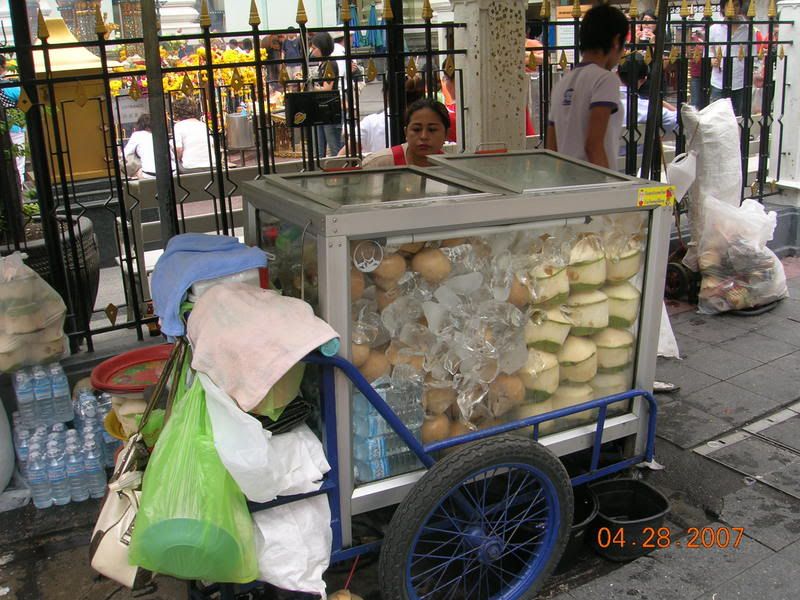
Right around the corner from our hotel, street vendors sell tender coconuts. The green outer layer is shaved off and the unopened coconuts are stored in an ice box of sorts.
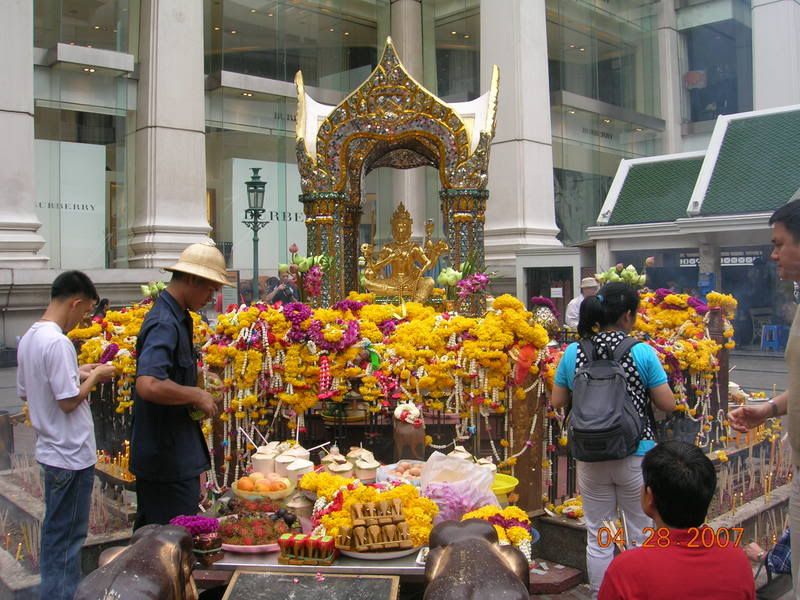
I thought that Pushkar was the only place in the whole world with a Brahma temple. Not so, as we found out in Bangkok. This shrine to Brahma is apparently very popular with anyone who has a favor to ask of God. The shrine occupies the corner of a busy intersection, right next to the Grand Hyatt Erawan. The story behind the location of the temple is that the hotel's renovation was not going very well and it was suggested to the management that they build a shrine to Brahma next to the hotel. The shrine was duly built and legend has it that the construction of the temple proceeded smoothly from that point on. And if you did not know, Erawan is Brahma's elephant.
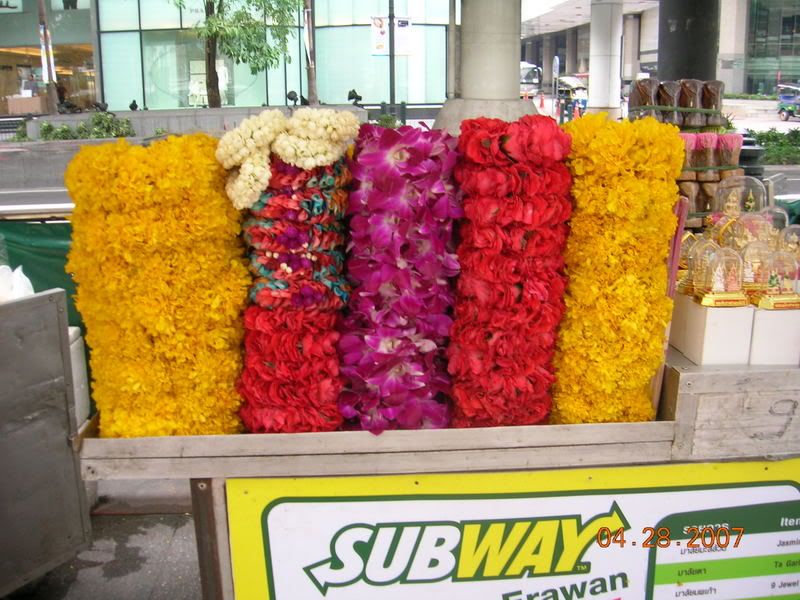
Flowers for sale next to the Brahma shrine. These shops also had incense sticks. If you duly noted the Subway sign, we did too and promptly headed there for lunch.
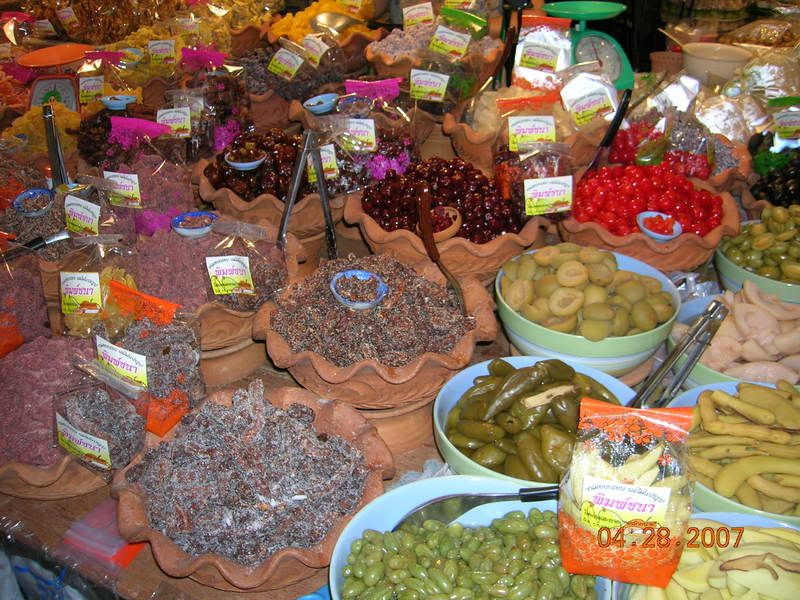
I love markets. The most enjoyable part of a trip for me is to stroll through the market in any new city. I love the hustle and bustle, looking at the wares for sale, the color, the people, the haggling, the sameness of the foods that we all eat, and the differences. And it also makes me feel, for half an hour at least, like a local.
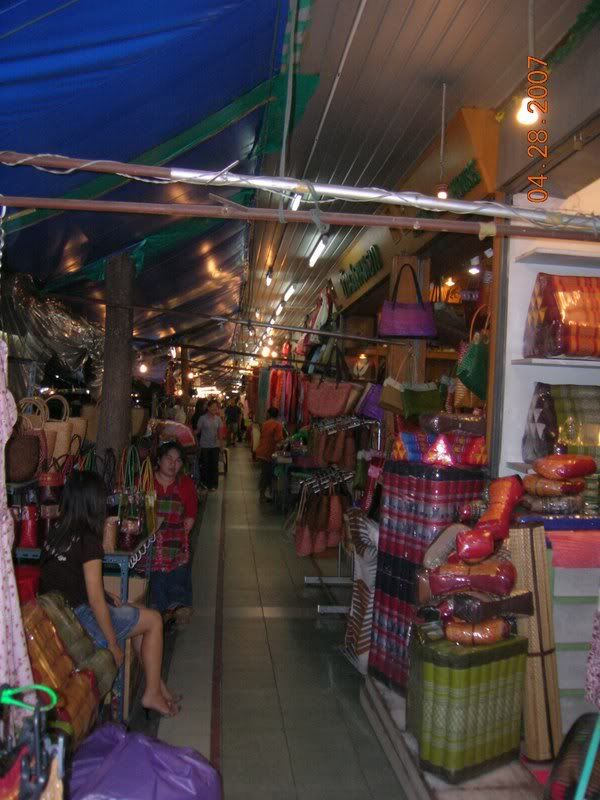
The Night Market is one of Bangkok's great attractions (please to banish all naughty thoughts from thy head), an open-air shopping mecca for tourists and locals alike. The market is definitely worth a visit. The prices are very reasonable and you may make a great find for your home or your closet in its maze-like corridors.
After dinner on the first day of our Bangkok stay, we flagged down a tuk-tuk and scrambled in. After the unavoidable haggling over the rate, the driver wiggled in his seat, settled himself in and tore through the Bangkok night. Tuk-tuk is a misnomer. The name apparently originated in the sound of the engines of the the original vehicles. The one we rode in and the other ones we saw on the streets were souped up versions (with myriad multi-colored flashing lights) and sounded more like planes taking off. Big N loved it, of course, and little N, safely ensconced in her father's arms was bewildered by the noise at first and then settled back to enjoy the ride.
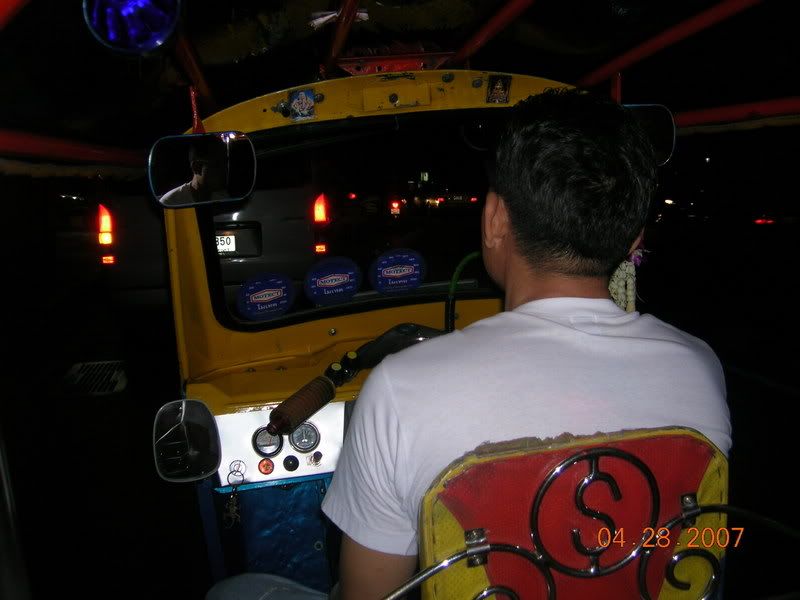
The next morning, we hired a local guide for a half-day tour of the important sights. Our first stop was the Reclining Buddha temple.
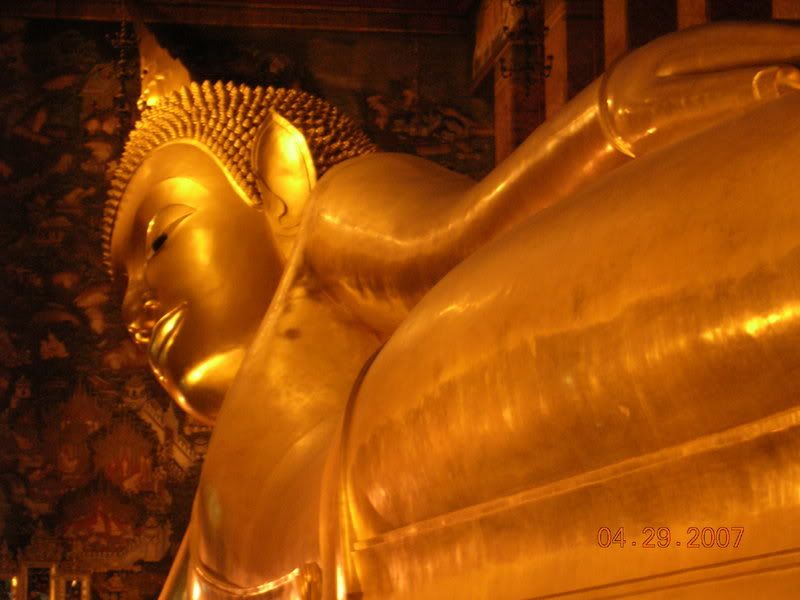
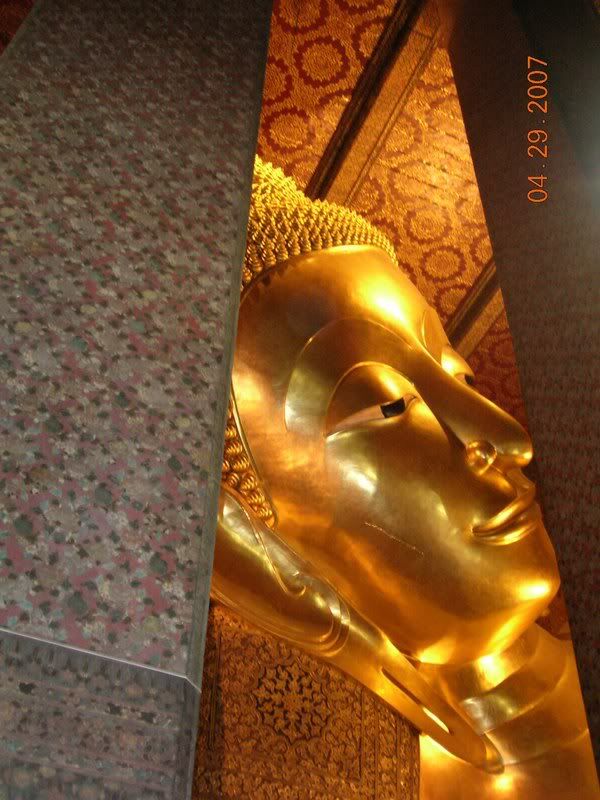
The Emerald Buddha temple adjacent to the Royal Palace was a sight to see. The sprawling temple complex houses many shrines with intricate design.
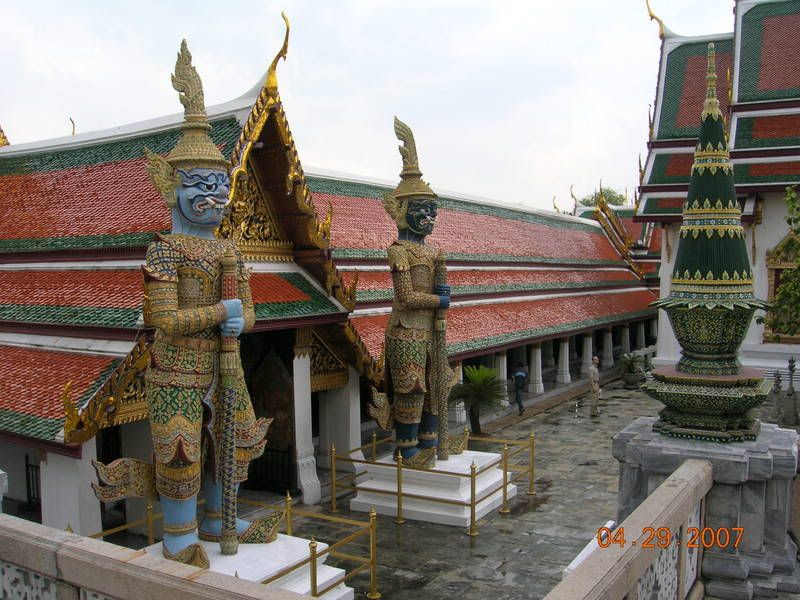
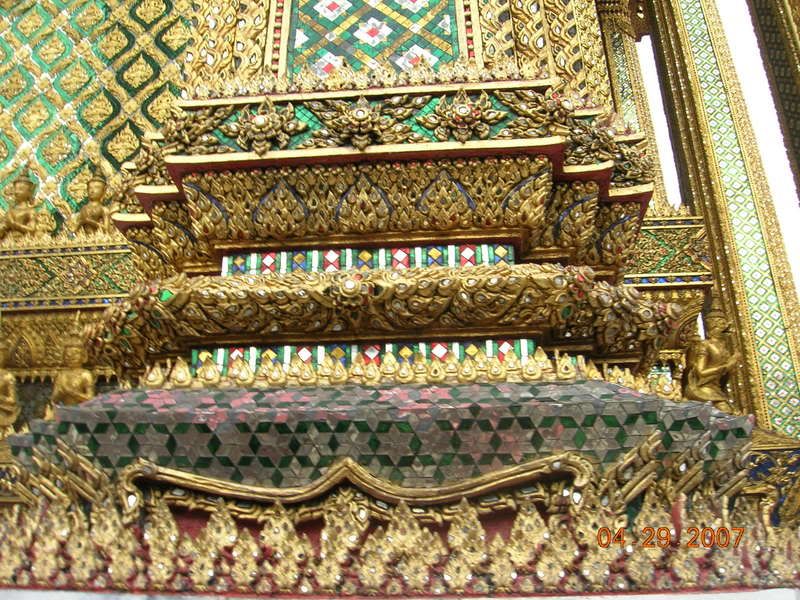
Lastly, Thai food was all that it is chalked up to be. We were big fans of Thai food, but as with Chinese food (which adapts to each country it is found in) we were afraid that we would be disappointed by the real deal. Happily, the Erawan Tea Room at the Grand Hyatt dispelled our apprehensions. The food was excellent.
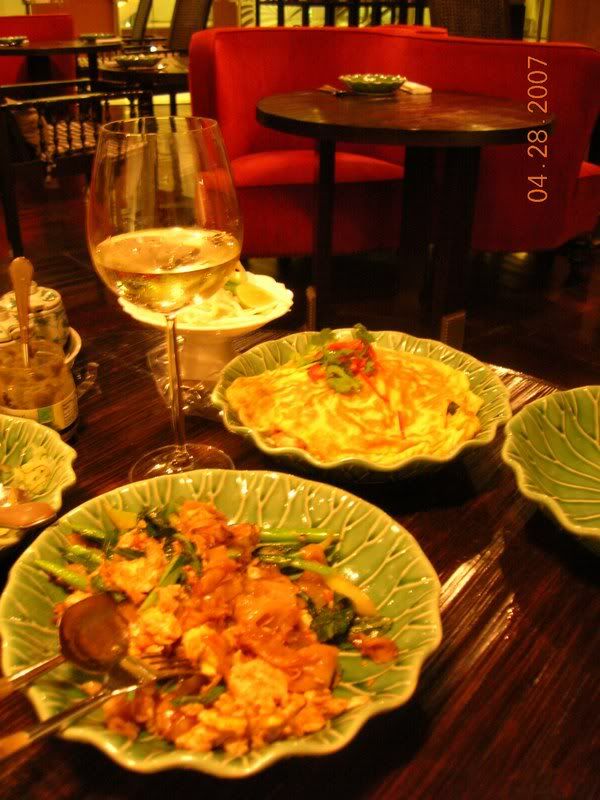
One last thing. All of the display of prosperity that is evident to a visitor's eyes has come at a price. Our guide told us that beyond the few square kilometers of Bangkok city proper, poverty is all too prevalent in the rest of the country. We were surprised by what appeared to be the non-existence of slums or shanties in Bangkok, but we soon realized that that was only an illusion as we drove from the Grand Palace back to our hotel. Very close to the King's official residence, rows and rows of slum dwellings became visible.
Similarly, the construction of magnificent Suvarnabhoomi International Airport was beset by allegations of corruption on the part of the government resulting in a coup in September 2006 during which the Royal Thai Army overthrew the then Prime Minister. When we visited Bangkok in April 2007, the coup was still in place.
There are reports of unrest and violence on and off in Thailand (there was a bomb blast in Bangkok this past New Year's Eve), mostly confined to the southern areas, so it's worthwhile checking the latest reports as you plan your trip.
A ride into the city did nothing to dispel any of these initial reactions. The roads were great. The buildings were well-maintained. The glass facades of the offices and malls shone with brilliance. It was like driving in some European city.
There was, however, plenty of evidence that we were, in fact, in Thailand.

Right around the corner from our hotel, street vendors sell tender coconuts. The green outer layer is shaved off and the unopened coconuts are stored in an ice box of sorts.

I thought that Pushkar was the only place in the whole world with a Brahma temple. Not so, as we found out in Bangkok. This shrine to Brahma is apparently very popular with anyone who has a favor to ask of God. The shrine occupies the corner of a busy intersection, right next to the Grand Hyatt Erawan. The story behind the location of the temple is that the hotel's renovation was not going very well and it was suggested to the management that they build a shrine to Brahma next to the hotel. The shrine was duly built and legend has it that the construction of the temple proceeded smoothly from that point on. And if you did not know, Erawan is Brahma's elephant.

Flowers for sale next to the Brahma shrine. These shops also had incense sticks. If you duly noted the Subway sign, we did too and promptly headed there for lunch.

I love markets. The most enjoyable part of a trip for me is to stroll through the market in any new city. I love the hustle and bustle, looking at the wares for sale, the color, the people, the haggling, the sameness of the foods that we all eat, and the differences. And it also makes me feel, for half an hour at least, like a local.

The Night Market is one of Bangkok's great attractions (please to banish all naughty thoughts from thy head), an open-air shopping mecca for tourists and locals alike. The market is definitely worth a visit. The prices are very reasonable and you may make a great find for your home or your closet in its maze-like corridors.
After dinner on the first day of our Bangkok stay, we flagged down a tuk-tuk and scrambled in. After the unavoidable haggling over the rate, the driver wiggled in his seat, settled himself in and tore through the Bangkok night. Tuk-tuk is a misnomer. The name apparently originated in the sound of the engines of the the original vehicles. The one we rode in and the other ones we saw on the streets were souped up versions (with myriad multi-colored flashing lights) and sounded more like planes taking off. Big N loved it, of course, and little N, safely ensconced in her father's arms was bewildered by the noise at first and then settled back to enjoy the ride.

The next morning, we hired a local guide for a half-day tour of the important sights. Our first stop was the Reclining Buddha temple.


The Emerald Buddha temple adjacent to the Royal Palace was a sight to see. The sprawling temple complex houses many shrines with intricate design.


Lastly, Thai food was all that it is chalked up to be. We were big fans of Thai food, but as with Chinese food (which adapts to each country it is found in) we were afraid that we would be disappointed by the real deal. Happily, the Erawan Tea Room at the Grand Hyatt dispelled our apprehensions. The food was excellent.

One last thing. All of the display of prosperity that is evident to a visitor's eyes has come at a price. Our guide told us that beyond the few square kilometers of Bangkok city proper, poverty is all too prevalent in the rest of the country. We were surprised by what appeared to be the non-existence of slums or shanties in Bangkok, but we soon realized that that was only an illusion as we drove from the Grand Palace back to our hotel. Very close to the King's official residence, rows and rows of slum dwellings became visible.
Similarly, the construction of magnificent Suvarnabhoomi International Airport was beset by allegations of corruption on the part of the government resulting in a coup in September 2006 during which the Royal Thai Army overthrew the then Prime Minister. When we visited Bangkok in April 2007, the coup was still in place.
There are reports of unrest and violence on and off in Thailand (there was a bomb blast in Bangkok this past New Year's Eve), mostly confined to the southern areas, so it's worthwhile checking the latest reports as you plan your trip.










No comments:
Post a Comment